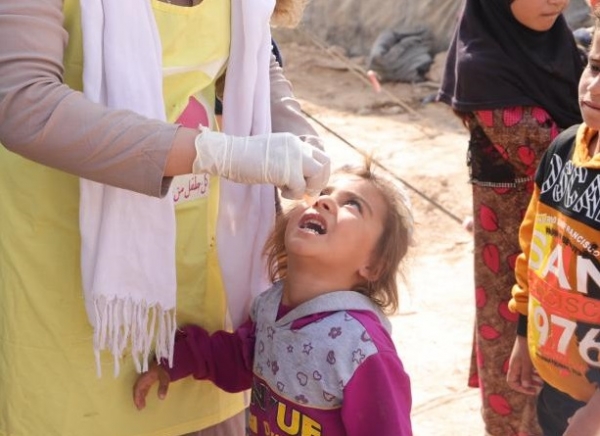Fever, fatigue, vomiting, limb stiffness, and a risk of irreversible muscle paralysis (in 1% of the cases) are symptoms and additional risks that Palestinian children face – on top of the continuous danger they've been exposed to since the beginning of the conflict.
After 25 years, polio has made a comeback, in an unprecedented theater of war and humanitarian crisis. Indeed, the poliovirus – belonging to the enterovirus family – has been found in the deteriorated water systems of Khan Younis and Deir Al-Balah, exposing countless Palestinian citizens to the risk of contracting this disease, which was considered eradicated from the Near East (and in the West) since 2001.
For months, information has been circulating about the presence of the three enteroviruses responsible for polio in Gaza's sewage system. Additionally, in recent days, the first human case of infection has been confirmed by the Amman laboratory (Jordan) in a ten-month-old child in Deir Al-Balah. Furthermore, when the Amman laboratory analyzes biological samples taken from other children with advanced symptoms, it may be possible to confirm whether the number of infected children is actually higher.
However, the World Health Organization (WHO) fears that infections are already widespread. With sewage systems destroyed by war and their contents spilling into streets, overcrowded refugee camps, and contaminating drinking water (now almost entirely absent), the number of minors already showing flu-like symptoms (the initial symptoms of polio) is high. Nonetheless, in a war context, with health infrastructure overwhelmed by the injured and hit by Israeli raids, monitoring and conducting thorough diagnostic tests on these children is virtually impossible.
UNICEF and WHO therefore want to immediately launch a vaccination campaign in Gaza, sending 1.6 million doses of oral antiviral vaccine to be administered to 640,000 Palestinian children. Children and youth in the Gaza Strip lack the antibodies to fight the virus if they come into contact with it due to the absence of inactivated virus vaccines or oral antiviral drops. In this regard, the preventive vaccination campaign to promote mass immunization against polio – which has already been significantly slowed down over the years – has been halted for months due to Israeli attacks.
The current health crisis requires an immediate truce to allow doctors, volunteers, and humanitarian teams to successfully begin the two vaccination cycles and attempt to stop the chain of infections. The UN is calling on the conflicting parties to promote at least a "Polio Pause" , respecting a ceasefire period to protect civilians and healthcare workers in this difficult and time-sensitive endeavor. The lack of adequate sanitary conditions and the continuous movement of civilians to escape the Israeli advance are additional obstacles to proper containment of the virus.
Polio knows no borders, does not care about politics, does not respect demarcation lines, does not take sides in the conflict. As reiterated by UN Secretary-General A. Guterres, only peace is the most powerful form of vaccine to stop the spread of polio. In fact, if the strain circulating in devastated Gaza is different from the strains against which the global population is protected by previous vaccinations, even more people would be at risk.
To read more, please visit:
- https://news.un.org/en/story/2024/08/1153276
- https://www.who.int/news-room/fact-sheets/detail/poliomyelitis#:~:text=Initial%20symptoms%20are%20fever%2C%20fatigue,under%205%20years%20of%20age.
- https://www.who.int/news/item/16-08-2024-humanitarian-pauses-vital-for-critical-polio-vaccination-campaign-in-the-gaza-strip
- https://www.science.org/content/article/virus-causes-polio-has-been-found-gaza-here-s-why-grim-news
- https://www.focus.it/scienza/salute/poliomielite-a-gaza



